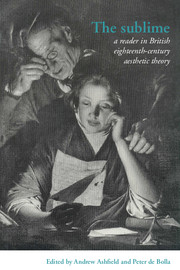Book contents
- Frontmatter
- Contents
- List of Abbreviations
- Introduction
- Part I The Longinian tradition
- 1 Dionysius Longinus on the sublime (1743)
- 2 Remarks on a book entitled, Prince Arthur (1696)
- 3 The advancement and reformation of modern poetry (1701)
- 4 The grounds of criticism in poetry (1704)
- 5 Essays upon several subjects (1716)
- 6 A miscellany of ingenious thoughts (1721)
- 7 An essay on the theory of painting (1725)
- 8 Reflections on the nature and property of languages (London 1731)
- 9 The works (1735)
- 10 Lectures on poetry (1742)
- Part II Rhapsody to rhetoric
- Part III Irish Perspectives
- Part IV The Aberdonian Enlightenment
- Part V Edinburgh and Glasgow
- Part VI From the Picturesque to the Political
- Sources and further reading
10 - Lectures on poetry (1742)
Published online by Cambridge University Press: 05 June 2012
- Frontmatter
- Contents
- List of Abbreviations
- Introduction
- Part I The Longinian tradition
- 1 Dionysius Longinus on the sublime (1743)
- 2 Remarks on a book entitled, Prince Arthur (1696)
- 3 The advancement and reformation of modern poetry (1701)
- 4 The grounds of criticism in poetry (1704)
- 5 Essays upon several subjects (1716)
- 6 A miscellany of ingenious thoughts (1721)
- 7 An essay on the theory of painting (1725)
- 8 Reflections on the nature and property of languages (London 1731)
- 9 The works (1735)
- 10 Lectures on poetry (1742)
- Part II Rhapsody to rhetoric
- Part III Irish Perspectives
- Part IV The Aberdonian Enlightenment
- Part V Edinburgh and Glasgow
- Part VI From the Picturesque to the Political
- Sources and further reading
Summary
Lecture IX
Of the beauty of thought in poetry; or of elegance and sublimity
…Beauty in writing may be considered as twofold: either the elegant, or sublime. The latter is manifestly distinct from the former; for there may be elegance often where there is no sublimity; but it may be questioned, on the other hand, whether everything sublime is not elegant. To me, indeed, it seems not so; or, if we must determine otherwise, it must be said that elegance joined with sublimity is often a different species of elegance. Whatever, indeed, is sublime, is beautiful. So Pallas is described by the poets, but with a beauty peculiar to herself, awful, majestic, surrounded with an amiable grandeur, quite different from the charms of Venus, who is possessed with all the soft attractives, who is all over elegant but very little sublime. But however this question be determined, in the sequel of this discourse I shall examine into the properties of each of these beauties distinctly, and afterwards joined together.
That noble and happy sublimity of thought which by Longinus is termed τὸπεϱὶ τὰς νοέσεις ἁτϱεπήβολον, is impossible to be learned by precept; it is the gift of nature only, though it may be much assisted by art.…
What Longinus calls yavxaoiai, and others, as he tells us, εἰτωλοποιίας the Roman writers style visions, or imaginations, and the modern images.
- Type
- Chapter
- Information
- The SublimeA Reader in British Eighteenth-Century Aesthetic Theory, pp. 55 - 56Publisher: Cambridge University PressPrint publication year: 1996



